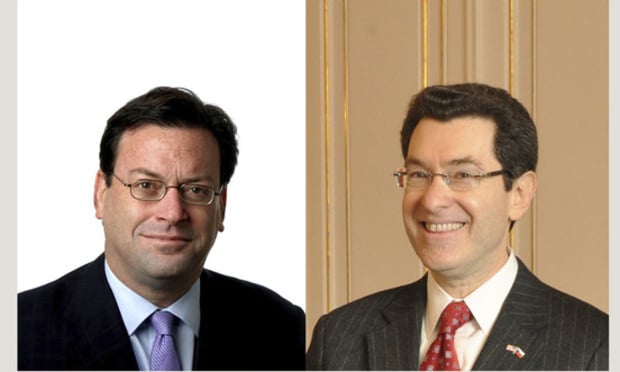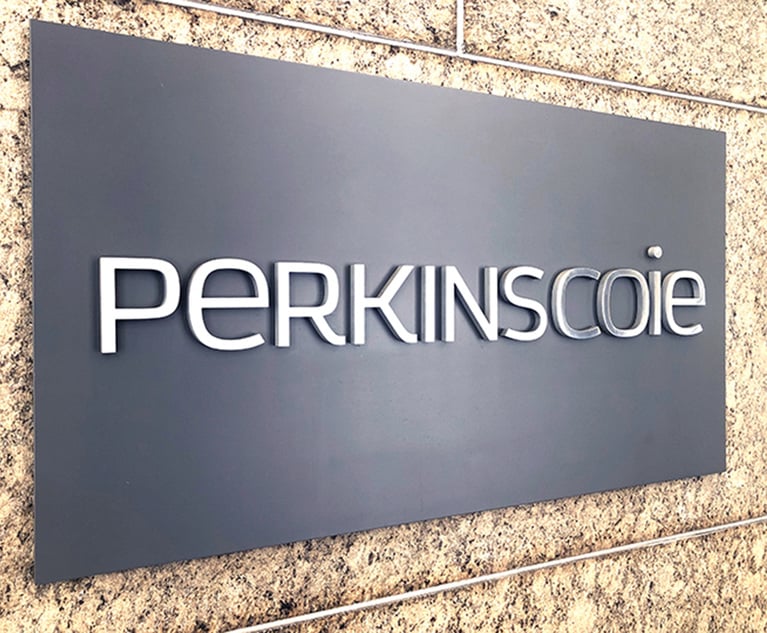Lawyers to Take the Stage in Questioning Trump Figures at Pre-Impeachment Hearings
While it's unclear which attorneys will handle questioning, eyes are turning toward Norm Eisen and Barry Berke.
September 12, 2019 at 11:47 AM
6 minute read
 Barry Berke, left, and Norman Eisen, right. Courtesy photos
Barry Berke, left, and Norman Eisen, right. Courtesy photos
Democrats on the House Judiciary Committee voted Thursday to give their counsel the power to publicly question witnesses, handing over more responsibilities to committee lawyers as they decide whether to formally start an impeachment inquiry against President Donald Trump.
The Judiciary Committee voted along party lines Thursday to pass procedures for hearings it holds on the potential impeachment proceedings. Under the rules, lawmakers from both minority and majority staff will be allowed to tap their attorneys for an additional 30 minutes of questioning for each side of witnesses appearing before the panel.
House Judiciary Committee Chairman Jerrold Nadler said the measure "will allow us to develop the record in ways" that the current rules for questioning don't permit. Members are generally given five minutes each to question a witness, meaning that any sidetracking or dodging of questions can quickly use up that time.
Nadler told reporters after the vote that the committee will now start an "aggressive series of hearings" as they weigh whether to start impeachment proceedings.
Thursday's move will spotlight the committee attorneys as the Judiciary panel holds more hearings on a possible impeachment of Trump.
Some have criticized lawmakers for their approach to questioning in past hearings, such as during that of former special counsel Robert Mueller III, claiming the members of Congress were aiming to put on a show rather than glean new information for their investigations.
Michael Conway, who worked on the House Judiciary Committee during its own impeachment inquiry during Watergate, said tasking committee lawyers with the more intensive questioning might lead to better results than letting members handle it on their own.
"The lawyers have one task which is to develop the questioning of a particular witness to elicit the relevant information," Conway said. "They have one item to press, and have fewer distractions than a member would."
While it's unclear which attorneys for the committee will handle questioning, eyes are turning toward a pair of outside counsel hired specifically to help with the Judiciary Committee's investigations regarding Trump and his administration.
Former Obama ethics official Norm Eisen and Kramer Levin Naftalis & Frankel's Barry Berke were hired as special oversight counsel for the committee earlier this year. The new rules could put them and other staff counsel who have been working behind the scenes on the public congressional stage, and add a new level of thoroughness in the questions posed to witnesses.
Berke's hiring caused some internal drama, with Trump Organization lawyer Alan Futerfas reportedly raising concerns to the panel over a potential conflict of interest because of Kramer Levin's prior work with the Trump Organization.
Collins later sent a letter to Kramer Levin asking for more information about Berke's work for the firm. Berke ultimately took a leave of absence from Kramer Levin as he moved forward with the Judiciary's efforts.
The pair of lawyers have been largely behind the scenes since joining the committee staff. But the rules could put them in the spotlight, as they take their legal skills to the committee chambers where witnesses who comply with subpoenas or congressional requests will appear.
The Judiciary Committee attorneys are set to debut their new-found questioning powers in a hearing featuring former Trump campaign head Corey Lewandowski on Sept. 17. Others within Trump's orbit who have been subpoenaed to appear before the committee have defied those requests, citing so-called immunity under executive privilege.
Republicans on the committee will also get to deploy their own staff to interview the witnesses, giving them a chance to either question a witness's credibility or otherwise ask questions that could downplay otherwise damning pieces of testimony.
However, Judiciary Republicans, including the panel's ranking member, Rep. Doug Collins, questioned Thursday why Democrats "desperately want to give their authority away to staff" instead of taking on the witnesses for a longer period of time themselves.
Committee Republican Rep. Matt Gaetz attempted to strike the use of the staff attorneys from the resolution, offering up an amendment that would give the additional questioning powers to lawmakers instead of committee counsel.
Other Republicans on the panel said that if, in the case of an investigation as possible impeachment, only members should be permitted to question witnesses.
"We're talking potentially about impeaching the president of the United States, and when we deal with something that is this serious and has only seriously been considered three times before," said GOP Rep. James Sensenbrenner, "I think it's important that only the members who are elected and are accountable for their actions here in Congress and to their constituents … do the questioning."
Members of Congress have previously tapped attorneys to lead questioning in past investigations, such as the Iran-Contra hearings. Nadler cited those hearings among others in arguing that it made sense for committee counsel to play a role in the impeachment hearings.
At one point, Republican Rep. Mike Johnson asked Nadler whether the procedure addressed an issue of time, or "of competency."
Nadler said it was an effort to address a House rule that limits members to five minutes of questioning. The chairman rebuffed the amendment, pointing to past instances where committee counsel have been given the chance to question witnesses.
But GOP members pushed back, saying the House rules could instead be altered to give lawmakers on the panel—most of whom, if not all, are lawyers or have law degrees—more questioning time.
The amendment was struck down by voice vote.
Thursday's vote played out as Democrats struggle with how to describe their current probe on the potential impeachment inquiry.
Nadler indicated in his opening statement that he was done with the debate on semantics of the investigation.
"Some call this process an impeachment inquiry. Some call it an impeachment investigation," he said. "There is no legal difference between these terms, and I no longer care to argue about the nomenclature."
But that didn't stop members from both sides of the aisle raising the matter throughout the hearing.
Collins, the Republican ranking member, compared the resolution to an Instagram filter, claiming that lawmakers could have carried out many of these procedures without having to pass the resolution.
"The filter might make you think something's happening," he said. "This is not anything special."
Read more:
DC Circuit Rebuffs Lawyer's Challenge to Trump's Financial Disclosures
Kramer Levin Squares Off With Trump Organization, Republicans Over Barry Berke Hire
This content has been archived. It is available through our partners, LexisNexis® and Bloomberg Law.
To view this content, please continue to their sites.
Not a Lexis Subscriber?
Subscribe Now
Not a Bloomberg Law Subscriber?
Subscribe Now
NOT FOR REPRINT
© 2025 ALM Global, LLC, All Rights Reserved. Request academic re-use from www.copyright.com. All other uses, submit a request to [email protected]. For more information visit Asset & Logo Licensing.
You Might Like
View All
Trump's DOJ Delays Releasing Jan. 6 FBI Agents List Under Consent Order
3 minute read
Judge Grills DOJ on Trump’s Birthright Citizenship Executive Order

Perkins Coie Backs Challenge to Trump's Ban on Transgender Military Service
4 minute read
Selendy Gay Files Lawsuit Challenging Trump's Workforce Reclassification EO
2 minute readTrending Stories
- 1States Accuse Trump of Thwarting Court's Funding Restoration Order
- 2Microsoft Becomes Latest Tech Company to Face Claims of Stealing Marketing Commissions From Influencers
- 3Coral Gables Attorney Busted for Stalking Lawyer
- 4Trump's DOJ Delays Releasing Jan. 6 FBI Agents List Under Consent Order
- 5Securities Report Says That 2024 Settlements Passed a Total of $5.2B
Who Got The Work
J. Brugh Lower of Gibbons has entered an appearance for industrial equipment supplier Devco Corporation in a pending trademark infringement lawsuit. The suit, accusing the defendant of selling knock-off Graco products, was filed Dec. 18 in New Jersey District Court by Rivkin Radler on behalf of Graco Inc. and Graco Minnesota. The case, assigned to U.S. District Judge Zahid N. Quraishi, is 3:24-cv-11294, Graco Inc. et al v. Devco Corporation.
Who Got The Work
Rebecca Maller-Stein and Kent A. Yalowitz of Arnold & Porter Kaye Scholer have entered their appearances for Hanaco Venture Capital and its executives, Lior Prosor and David Frankel, in a pending securities lawsuit. The action, filed on Dec. 24 in New York Southern District Court by Zell, Aron & Co. on behalf of Goldeneye Advisors, accuses the defendants of negligently and fraudulently managing the plaintiff's $1 million investment. The case, assigned to U.S. District Judge Vernon S. Broderick, is 1:24-cv-09918, Goldeneye Advisors, LLC v. Hanaco Venture Capital, Ltd. et al.
Who Got The Work
Attorneys from A&O Shearman has stepped in as defense counsel for Toronto-Dominion Bank and other defendants in a pending securities class action. The suit, filed Dec. 11 in New York Southern District Court by Bleichmar Fonti & Auld, accuses the defendants of concealing the bank's 'pervasive' deficiencies in regards to its compliance with the Bank Secrecy Act and the quality of its anti-money laundering controls. The case, assigned to U.S. District Judge Arun Subramanian, is 1:24-cv-09445, Gonzalez v. The Toronto-Dominion Bank et al.
Who Got The Work
Crown Castle International, a Pennsylvania company providing shared communications infrastructure, has turned to Luke D. Wolf of Gordon Rees Scully Mansukhani to fend off a pending breach-of-contract lawsuit. The court action, filed Nov. 25 in Michigan Eastern District Court by Hooper Hathaway PC on behalf of The Town Residences LLC, accuses Crown Castle of failing to transfer approximately $30,000 in utility payments from T-Mobile in breach of a roof-top lease and assignment agreement. The case, assigned to U.S. District Judge Susan K. Declercq, is 2:24-cv-13131, The Town Residences LLC v. T-Mobile US, Inc. et al.
Who Got The Work
Wilfred P. Coronato and Daniel M. Schwartz of McCarter & English have stepped in as defense counsel to Electrolux Home Products Inc. in a pending product liability lawsuit. The court action, filed Nov. 26 in New York Eastern District Court by Poulos Lopiccolo PC and Nagel Rice LLP on behalf of David Stern, alleges that the defendant's refrigerators’ drawers and shelving repeatedly break and fall apart within months after purchase. The case, assigned to U.S. District Judge Joan M. Azrack, is 2:24-cv-08204, Stern v. Electrolux Home Products, Inc.
Featured Firms
Law Offices of Gary Martin Hays & Associates, P.C.
(470) 294-1674
Law Offices of Mark E. Salomone
(857) 444-6468
Smith & Hassler
(713) 739-1250








